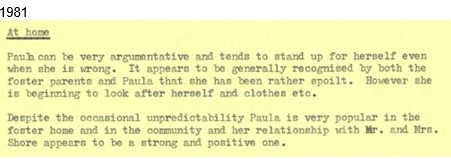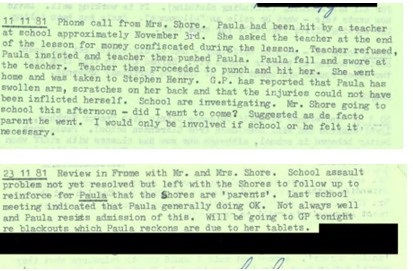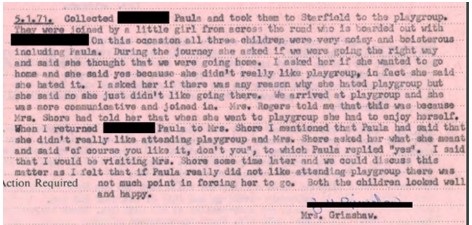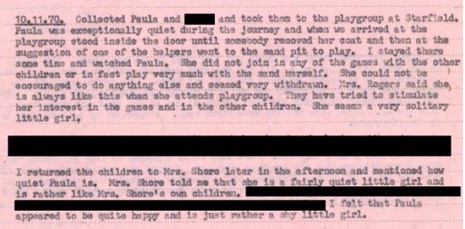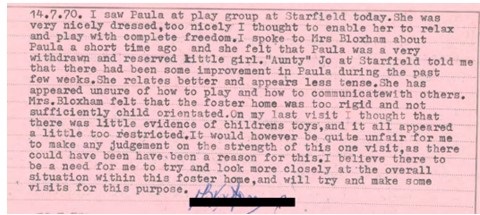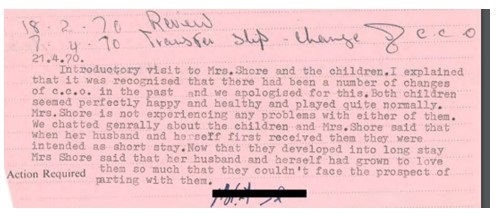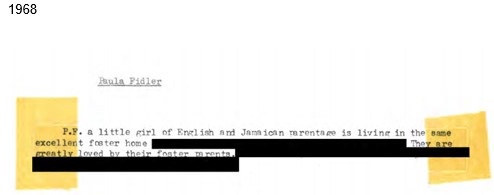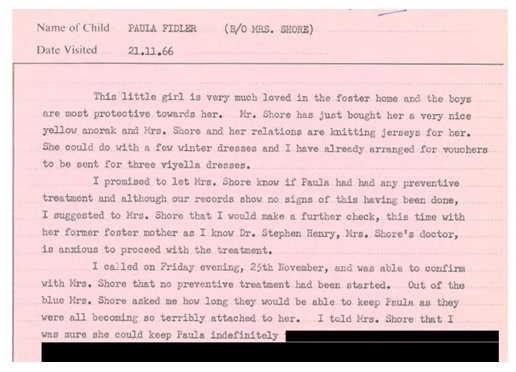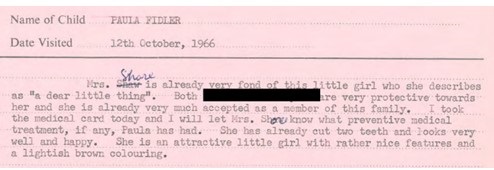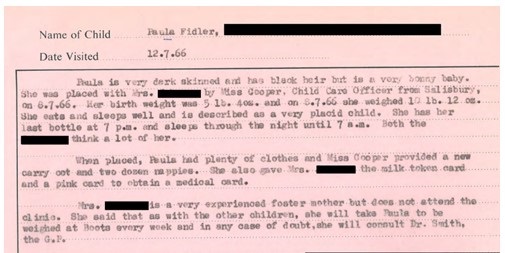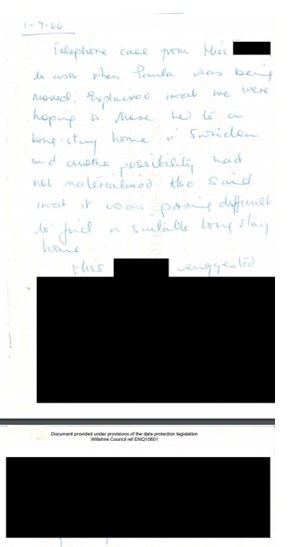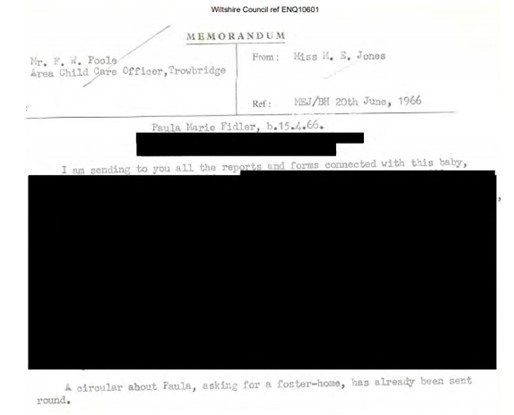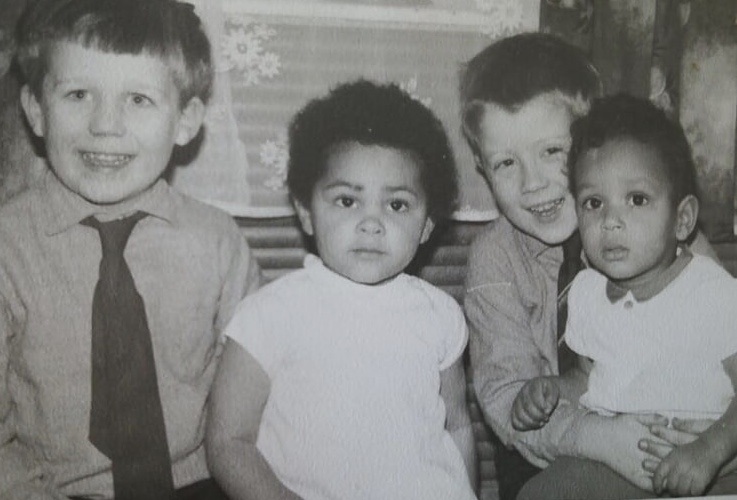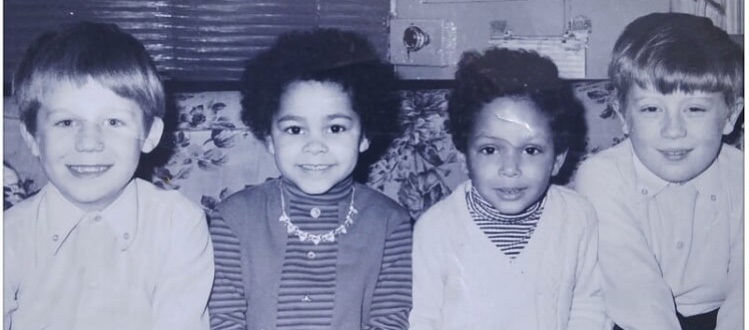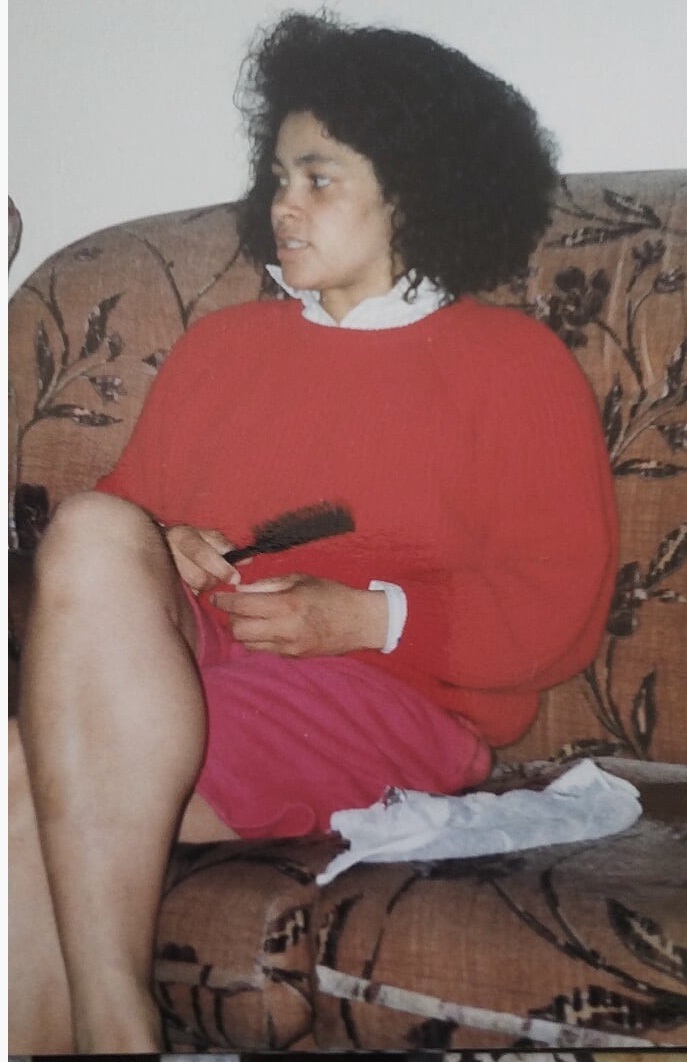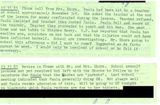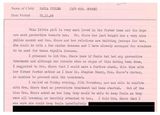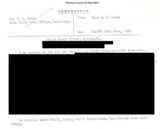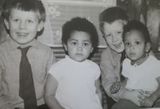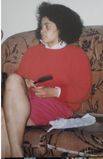Paula Marie Fidler
Paula Marie Fidler was born on the 15th April 1966 and because of the context of her birth; colour of her skin; white and Jamaican heritage; the period in which she was born, and the fact that her mother was a young unmarried teenager without the total support of her family to keep Paula, Paula was admitted into the child care system. That’s what society told her and that’s what she believes to be true.
Major Events Timeline
- 1966 Born in Wiltshire
- Fostered for 5 months in and around Wiltshire
- 1966 Arrived with foster parents that would never formally adopt me but would be known forever more as mum and dad. In family of 2 boys, 1 adopted and the other was my parents’ natural son, another boy would join 10 months later. Hence, I grew up in a family with 4 children; 3 brothers.
- 1975 Became seriously ill and had nephrectomy, the disease which led to this surgery took approximately a year to be diagnosed and recover from.
- 1981 Physical assault on me by secondary school teacher
- 1982 Left school with no qualifications and went to local college; left with diplomas
- 1984 Left Wiltshire home, met future husband who was recently divorced with 2 children (daughter and son) and moved to Bath
- 1985 and 1987 had two sons
- 1987 Visited Canada and USA – childhood dream come true and whetted appetite for more travel
- 1991 Achieved black belt and over a period of 2-4 years was British, English and Welsh Champion of Tae Kwon Do across all 3 disciplines sparring, patterns and breaking wood
- 1996 Achieved BSc and QTS – started work in primary school as a temporary teacher in Bristol
- 1997 – started role as teacher in Wiltshire – hometown
- 1999 Moved to Cambodia and left children (12 and 13 years old) at home with the intention they would arrive 4 months later with their dad
- 2000 Returned to UK and took up temporary teaching post in BANES (Bath and North East Somerset)
- 2000 Took on permanent teacher role in a different primary school in BANES
- 2004 Started work as associate lecturer with the maths team at Bath Spa University as well as continuing class teaching in current school in Bath
- 2004 Father passed away
- 2005 Achieved first diploma equiv. in education
- 2006 Moved to USA and became a Fulbright scholar
- 2007 Moved to London as deputy headteacher, retained home in Bath – first grandchild was born
- 2010 Moved to Devon to take up interim headteacher post in small village school and achieved NPQH – National Professional Qualification of Headteachers – 2nd diploma equiv. was awarded for being a top 5% school and one of Devon’s most improved primary schools out of 500 schools
- 2011 Moved back to Bath – took up first substantive headteacher post in a primary school in Bristol in special measures
- 2011 Husband’s ex-wife and stepchildren’s mother passed away
- 2013 Mother passed away
- 2014 Was awarded by Bristol as an inspiring headteacher and school was judged as good by Ofsted; the first time in the school’s history
- 2015 Took sabbatical and returned to executive headteacher post across 5 primary schools, including previous school where I was the headteacher – 2nd grandchild was born.
- 2016 Brother passed away – achieved NPQEL – National Professional Qualification for Executive Leadership - Executive Headteachers - 3rd diploma equiv.
- 2017 Broke leg, was made redundant and moved back to London where I took up a temporary primary headteacher post across two schools in a Multi Academy Trust. The schools were at best RI when I arrived as they had an absent headteacher for a 6 month period. I secured their best set of data - attendance, staff and community satisfaction, KS1 and 2 SATs and Ofsted rating of good.
- 2018 Took a one term interim primary headteacher post in Nottingham - 3rd grandchild born
- 2019 Took up a further 9-month sabbatical to reflect and seek future suitable role
- 2019 Moved out of London and sold house
- 2019 Moved to Bracknell to take up post as school improvement advisor with local authority
- 2020 – I live in Bracknell and Bath. Have visited 37 countries. Although I love my job, I intend to retire in 2022 to travel more widely, study and learn. I have 2 stepchildren, 2 step grandchildren, 2 sons, 3 grandchildren and husband of 36 years, play tennis, ride my bike to work and swim regularly.
The parents who cared for and loved Paula, and the parents Paula called mum and dad always told Paula that her birth mother had kept her for 5 months - she didn't. Paula's birth mother gave Paula into social care immediately after her birth. The story continued – during this 5 months, Paula’s birth mother was able to disguise the fact that Paula was of Jamaican heritage, preferring to protect herself and her relationship with her first new-born baby; telling all agents that Paula was Italian. If Jamaicans were held in high regard and were respected as much as ‘white Europeans' and not considered a blight upon the British community, perhaps Paula’s birth mother would have been proud to say that Paula was of Jamaican heritage and would have kept her and Paula would not have looked at her first born son 20 years later and question how could her birth mother have given her away, when the love Paula had for her first born was immediate and intense.
That little girl is me and I’m think that for a large part of my life I carry the guilt and embarrassment that I was told my birth family had experienced because of my birth. I can't help reading this without feeling the deepest rejection, which always brings tears to my eyes. I recognise, just like Frankl’s basic first principle of logotherapy,
‘Life has meaning under all circumstances, even the most miserable ones.' Which suggests I should embrace all that I feel and see in order to understand the meaning of my life.
Throughout my social care records, which total 352 pages, it becomes a distressing realisation of knowing that my lived values of love and compassion are embraced by too few, but also that I was living and growing in a prejudiced and discriminatory community. Whenever I see baby Paula Marie through the pages of despair, I just want to pick her up, hold her tightly and tell her it's going to be OK that she is worthy and she can be hopeful.
However, I maintain if you cannot validate yourself, how can you possibly validate and value others? If we are here to live in a community where we are to support each other's goals and ambitions, love each other, respect each other, have compassion for each other, how can we, if don't even extol those feelings upon ourselves?
Sometimes when you stand on the edge of the shore and you are repeatedly bashed by the force of the hurricane like waves, it is difficult to stand up and face them again and again.
From the slight increase of black women in senior posts and in careers that were once only considered to be for white men and the panacea of changes and positive opportunities for black women, I can see that we are on the brink of re-framing what it means to be a black British person, reframing what it means to be a black British woman. That can only happen if others too embrace the values of compassion, love, forgiveness and equality. I witness these values in thousands of people but I feel it needs to be everyone. I have lived what I believe to be a fulfilled life, despite what my social care records forecast. Where they suggested I was likely to live a life of hopelessness and a life of low expectations - 'career that was totally unrealistic' - I wanted to get a degree and live overseas. For whatever reason, that hasn't been me, so when I look at this child who is rejected at birth, I don't understand what happened in their life or in their adulthood to make them become them. I’m not hopeless or worthless or not as worthy, despite that characteristic being presented to me and my black peers repeatedly, even 53 years later, think Meghan Markle. I can't help thinking that when you are rejected at birth and beyond-' has anyone a long term foster home for this half caste baby?' and being beaten by my teacher at 16 (because I deserved it) and no-one really taking the stance to address, protect me and apologise for this hideous act that I vividly remember - it is because somebody has labelled you as hopeless and worthless.
When white people are no longer considered to be the main levers of power what happens then? This is a line of enquiry I will follow - are 'we' ready? are 'we' content with that pursuit? In my role now I am working with, training with and conferencing with some of the most experienced people in their field and I totally respect them. How do I explore with them, without being labelled a troublemaker or worse, that they are an influencer and full of talent, but occasionally by their potentially innocent actions, they are continuing to perpetrate the biases and preventing equality from being a realisation for all? I see it all the time. It is so obvious and entrenched. Every week I am in schools I see white practitioners’ behaviours and biases it is mostly subtle and not intended to offend or prevent those from equality of opportunity, but it does. I am not saying I am immune from these behaviours. At some points my own biases come into play, which conflict with my mission. I have thousands of stories I could convey to illustrate how my biases and that of others do this. I continue to collect them. I wish I didn’t, but that is living and living theories methodology helps to deepen my understanding of the world in which I live.
I’m not saying I can do it on my own and I certainly don't want to do it on my own, but if we are to reframe what it means to be black and British and to enable people to look at me and people like me and to be happy that I live in the same street, that I eat at the same table, that I travel on the same train, that I have the same car, that I live in the same apartment block as them and they don't look at me and take a deep breath, then I will never be content enough. Somebody must be that voice who tackles this. I hate being that voice for so many reasons.
A story
While addressing some discriminatory behaviour toward me recently and working with a charity which addresses discrimination in the workplace or community, the advice I was given was to keep my voice quiet, as if it was too loud, I would never find another job. I questioned why they would say that to me given that their life’s work was to redress the imbalance and to protect me and others like me by making sure my voice was louder and was full of integrity, more than it had ever been before. Surely, I should have been told - we need you to stand up. We are behind you. There are many people behind you. There are many people beside you. There are many people who have come before you; you are next in the line. We and your black peers are united in our cause to address the social injustice that blacks and others conitnue to face.


